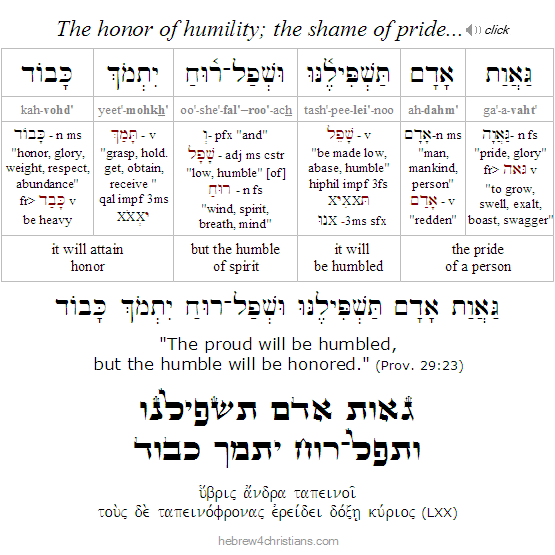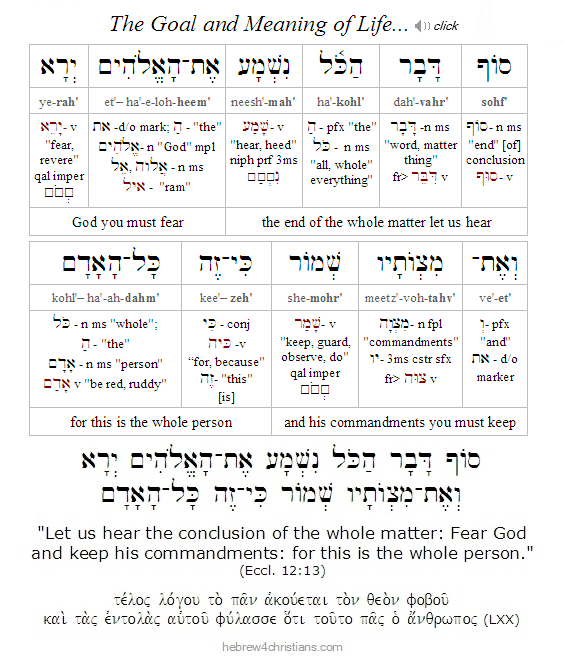|
It is written in our Torah portion for this week (i.e., Pinchas), "My offering, my food for my food offerings, my pleasing aroma, you shall be careful to offer to me at its appointed time" (Num. 28:2). Food for God? What need has the LORD for food? But by this is meant "as you have done it to least of these my brethren, you have done it unto Me" (Matt. 25:40). The offerings you make to tzedakah (giving charity, your time, your kindness, etc.) constitute food presented before the secret place of God's altar...
God created Adam alone, as a solitary being, made in the divine image, to teach us that to destroy a single life is to destroy an entire world, and to sustain a single life is to sustain an entire world. Therefore everyone should say: 'For my sake the world was created' (Talmud). Each of us is olam katan (עולם קטן), a small world that represents the large world. Indeed, one righteous human being can sustain the entire world, as it is written (Prov. 10:25), "the righteous is the foundation of the world" (וְצַדִּיק יְסוֹד עוֹלָם).
On the other hand, balance is of course required here. Each of us is olam katan, a small world, though, as Rabbi Noah of Lekhivitz once wisely said, "if we are small in our own eyes, we are indeed 'a world,' but if we are a 'world' in our own eyes, we are thereby made small." This thought obviously echoes Yeshua's teaching: "Whoever exalts himself will be humbled, and whoever humbles himself will be exalted" (Matt. 23:12).
גַּאֲוַת אָדָם תַּשְׁפִּילֶנּוּ
וּשְׁפַל־רוּחַ יִתְמךְ כָּבוֹד
ga·a·vat · ah·dahm · tash·pee·lei'·noo
oo·she·fal · roo'·ach · yeet·mohkh · kah·vohd

"The proud will be humbled,
but the humble will be honored"
(Prov. 29:23)


There are assumptions we bring to the reading of Torah that affect how we read and what we will hear... The sages generally agreed that the greatest principle of Torah is to love your neighbor as yourself (Lev. 19:18), though Ben Azzai further said that even greater is the principle that God created man in His likeness (i.e., bid'mut Elohim, בִּדְמוּת אֱלֹהִים, in "outline" or "silhouette," the word demut [דְּמוּת] a synonym of tzelem [צֶלֶם], a "shadow" or semblance) since then one cannot say, 'Since I despise myself I can despise another as well; since I curse myself, let the other be accursed as well.' Being made in God's likeness means how we regard ourselves and others will be the measure we regard God Himself (1 John 4:20). Therefore the first commandment is always, "I am the LORD thy God..." (Exod. 20:2), since apart from faith, there is no Torah of any kind.
Eleazar ha-Kappar used to say: "They who have been born are destined to die. They that are dead are destined to be made alive. They who live are destined to be judged, that men may know and make known and understand that He is God, He is the maker, He is the creator, He is the discerner, He is the judge, He is the witness, He is the complainant, and it is He who will in the future judge, blessed be He, in whose presence is neither guile nor forgetfulness nor respect of persons nor taking of bribes; for all is His. And know that everything is according to the reckoning. And let not your evil nature assure you that the grave will be your refuge: for despite yourself you were fashioned, and despite yourself you were born, and despite yourself you live, and despite yourself you die, and despite yourself shall you are destined to give account and reckoning before the supreme King of kings, the Holy One, blessed be He." (Mishnah Pirkei Avot 4:29)
Hebrew Lesson:
Eccl. 12:13 Hebrew reading:
|





